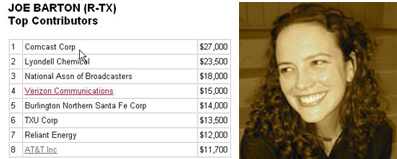Net neutrality vote: the cost in human terms


That's the most current list of campaign contributors to U.S. Rep. Joe Barton (R-Texas), chair of the U.S. House Energy and Commerce Committee.
Right next to that list, is a photo of blogger Britt Bravo, who notes on a BlogHer post that her Mom left her a voice message strongly recommending that she keep an eye on legislation challenging network neutrality and sign an online petition on savetheinternet.com.
Britt's Mom's wishes might not have prevailed yesterday, but she is in the right.
As many if not most of you know by now, Rep. Barton's Committee rejected a Net neutrality amendment yesterday by a vote of 34-22. As my colleague Declan McCullagh reports, Rep. Barton was so gung-ho against the measure that he called in amendment opponents from the hallways and ensured they would be on hand to vote the way he wanted them to.
Declan notes that Barton argued Net neutrality proponents were overstating their case and were exaggerating the dangers of a more laissez-faire (i.e., let the market decide) approach. "I don't think all the Draconian things they (net neutrality backers) predict will happen if we don't adopt their amendment," he said.
But those who favor net neutrality laws would beg to differ. Including Britt and her Mom.
"When your mother leaves you a message, in the same tone that she leaves you a message to remember to buy sunscreen with UVA and UVB protection, that you might want to keep your eye on legislation challenging network neutrality and to go to savetheinternet.com and publicknowledge.com, you know it's serious," writes Britt, whose work also appears on Have Fun • Do Good and NetSquared.
Britt then amplifies her point by noting an email campaign from non-partisan media information organization Free Press that suggests the type of real, live human beings who will suffer if net neutrality does not become law and broadband service providers get to choose their favorite packet people:
Google users -- Another search engine could pay AT&T to guarantee that it opens faster than Google on your computer.
iPod listeners -- Comcast could slow access to iTunes, steering you to a higher-priced music service that paid for the privilege.
Work-at-home parents -- Connecting to your office could take longer if you don't purchase your carrier's preferred applications. Sending family photos and videos could slow to a crawl.
Retirees -- Web pages you always use for online banking, access to health care information, planning a trip or communicating with friends and family could fall victim to Verizon's pay-for-speed schemes.
Bloggers -- Costs will skyrocket to post and share video and audio clips -- silencing citizen journalists and amplifying the mainstream media.
Online activists -- Political organizing could be slowed by the handful of dominant Internet providers who ask advocacy groups to pay a fee to join the "fast lane."
Small businesses -- When AT&T favors their own services, you won't be able to choose more affordable providers for online video, teleconferencing, and Internet phone calls.
Innovators with the "next big idea" -- Startups and entrepreneurs will be muscled out of the marketplace by big corporations that pay for a top spot on the Web.
Britt Bravo then soaks all this in and writes what she is going to do next.
"You know I'm signing a petition and calling my Congressperson; otherwise, what am I going to tell my mother?"
All I can say, Britt, is (I'm sure you're expecting this and have heard it a thousand times, but) BRAVO!!